Oz the Bland and Predictable. Oz The Dull and Pitiable. Oz The Safe and Marketable. Oz The…zzzzzzzzzzz.
Could you make a movie worse than Sam Raimi’s Oz The Great and Powerful? If you did you’d instantly cross over into the rarified world of “so bad it’s great.” Oz does not exist in that world. Oz is no Zardoz, in other words. Oz The Slow and Laughable is not funny, it’s not scary, it’s not exciting, it’s not pretty. It’s boring as sin and dumber than a bag of hammers. A movie about a bag of hammers would be better than this. (Note to Pixar—idea for new movie: a lovable family of anthropomorphized talking hammers loses their home and must find a new bag to live in. Tom Hanks stars as the irascible yet lovable Ball-Peen. You’re welcome.)
Who directed this movie? Tim Burton? He might as well have for all the originality of vision on display (none at all). Let’s blame the writers first, though, namely Mitchell Kapner, writer of the Bruce Willis comedy classics The Whole Nine Yards and its sequel The Whole Ten Yards, and David Lindsay-Abaire, writer of last year’s Rise of The Guardians, about which nobody remembers anything. I am being strictly honest and literal when I say that a small group of well-organized penguins could, if given enough fish, write a better screenplay.
Oz is I think supposed to be a comedy. There are definitely jokes in it. You can tell because they’re set up for about five minutes to make sure you don’t miss them. Example: the movie opens in dreary black and white Kansas, land of misery and gloom. James Franco as seedy magician Oz seduces his lovely new assistant. He’s about to kiss her when—bam! The door to his trailer bursts open and there’s dopey Zach Braff. Oz reminds him that he’s supposed to knock. Ha! It’s already hilarious. Zach exits. Oz goes back to seduction, giving us plenty of time to think, “They’re not really going to make a joke out of Zach bursting back in after knocking first? Because if they did that they’d do it right away. Surely they can’t mean to make us wait this long for the joke we knew was coming the moment he came in the first time?” And then Zach bursts back in. That’s the joke. There are no funnier jokes in the movie.
This is the kind of script where characters state out loud everything that happens while we’re watching it happen in case we weren’t sure what was happening. Example: once in the Land of Oz the magician Oz gets himself a helper-monkey voiced by Zach Braff. To distract a witch, Oz tells the monkey to make animal sounds. Which actually that’s a joke right there. Animal sounds. Ha! Because a monkey is a kind of animal! Are you still with me? Moments later the monkey makes the sound—of a cow! He moos! Even though he’s not a cow. You see? He’s actually a monkey. I know, right? I’m wiping tears away as I write this. Still, you have to admit it’s a little confusing to have a monkey mooing when clearly he should be making monkey sounds. So the little girl made out of china, China Girl, says, “He’s mooing!”
This happens in every scene. Which is why every scene lasts about ten minutes too long. Oz mentions fireworks early on, to the confusion of whichever witch he says it to. At the end of the movie, as fireworks explode above the Emerald City, Glinda smiles and says, “Fireworks.” Oh, what? Fireworks? You see them too?
I know, Oz is made for kids five years old and under who’ve never seen a movie before. Still, does it have to be this boring? Does it have to be this dumb? Every scene is so obvious and generic. When Oz finds China Girl in her destroyed China Town, she reveals that her legs, made of china, mind you, are broken off, and you think, “Oz can just glue them together again.” Eons later Oz gets an idea. He searches his magic bag and—glue! Yes, he’ll fix her legs with glue! A miraculous substance everyone’s blown away by. Because I guess there’s nothing sticky in the Land of Oz.
The plot of Oz is identical to Raimi’s far more entertaining Army of Darkness. Not that it’s an original plot to begin with. But it’s still weird to see it remade this way. Stranger appears in a strange world, is told a prophecy has predicted he will save the day. Stranger goes along with it at first, always looking for a way out. Eventually admits he can’t help, is then shamed into helping by a hot girl, and saves the day by leading a scrappy band of munchkins and/or primitive screwheads in battle against outrageous odds.
Oz is written in the generic style popularized by David Koepp (check out his credits; I dare you not to weep) where story doesn’t come from character, it comes from genre. Scenes are laid out in advance per the formula, and the characters are walked through them. This relieves the writers from coming up with original ideas. They need only place the generic characters in the generic scene, put generic lines and generic jokes in their mouths, and move on to the next scene. Example: as the big battle gets underway at the end of the movie, Glinda is captured by flying baboons. She sees them coming. Why not zap them with her wand? Why not back up ten feet into those trees? Why not do anything to evade capture? Simply because it’s time for her to be captured. Character logic doesn’t come into play.
With all the money and power at his fingertips, I wish Raimi would add at least a little more personality into these big budget movies of his. Oz looks like it was directed by the Disneyficator 3000. You want a magical land of wonder? Check this out, the flowers are all—wait for it—giant flowers! Yes, it’s that imaginative. It makes the ten minutes of Burton’s Alice In Wonderland I watched on cable that one time look good. Well, not as bad. Would you believe equally awful?
Are there actors in the movie? There are. James Franco is squinty and uncomfortable and spends the whole movie wearing a smirk that says he’s not going to fall for whatever joke’s being played on him. Mila Kunis’s idea of acting is to widen her eyes to varying degrees and, once changed into the Wicked Witch, to screech like a hyena with its balls in a vice. Other actors do other things.
Is there anything good in this movie? I liked the China Girl’s design. Oz’s face projected in the smoke at the end looked cool. And—no, I guess that’s it.
This is every bit the Disney product it’s advertised as. Nothing about it is fun. It’s tired from the very first scene. There’s no sense of wonder or discovery. The characters are thin, the dialogue is bad, there’s not a single original joke. Watching Oz The Great And Powerful is a depressing experience.
So. Penguins. Think about it. Give them a big enough keyboard so they can type with their wings, a windbreak so they can relax, plenty of fish, and a few key plot points. If they squawk about residuals, set a polar bear loose on ’em. There’s no downside. We all win.

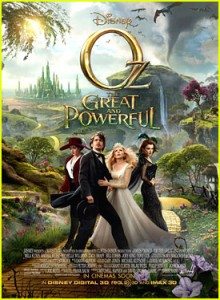


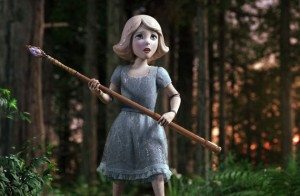

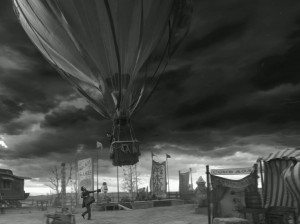
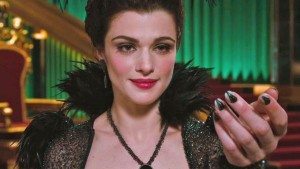
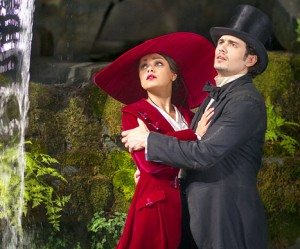
Yeah, I liked it a lot. It was engaging and funny, and it managed to find the right tone, which I think is really tricky with this subject in our cynical time. It was cast really well, it hit a lot of emotional notes, and managed to be true to the original in a lot of ways. James Franco was perfect for this role. It’s one of the better movies I’ve seen in awhile, and I’d see it again. I even look forward to the dozen sequels they will surely make.
Don’t get scared off by this grumpy, old reviewer. He means well, I’m sure.
oh, you.
I also liked it a lot. It was engaging and funny, and it managed to find the right tone, which I think is really tricky with this subject in our cynical time. It was cast really well, it hit a lot of emotional notes, and managed to be true to the original in a lot of ways. James Franco was perfect for this role. It’s one of the better movies I’ve seen in awhile, and I’d see it again. I even look forward to the dozen sequels they will surely make. Bzzzztt-zzt-zkkdkdk… HEAD EXPLODE WITH SARCASM OVERLOAD.
rebooting… rebooting… please wait.
Oh. Hi Tano. I’m glad you liked this movie. It made me want to drink molten aluminium cocktails with my eyes.
I did laugh a few times. I thought some of the effects were good. I disagree that it showed no visual style, but I do think the visual style was in support of a wholly lackluster script and that it succumbed to the too-common trap of “an all CGI world can feel real!”
The costuming was also good.
On the whole, I thought it was like a Chris Columbus Harry Potter movie but without any characters I cared about save poor little China Girl. (Oh baby. Just you shut your mouth.)
I think this movie is a good platform for a larger discussion of how to talk to your kids about bad movies.
Abby (who is 9) loved this movie. She told me this as we left the theater. I was horrified. Not because the movie was aesthetically offensive, even though it was–there are plenty of dumb, badly acted movies and TV shows that I like, although arguably not as bad as this one, but in any case I’m not going to tell my 9 year old she’s wrong for enjoying herself at the movies.
But this movie was morally perverse! The wicked witch of the west–the lovely if naive young women who is, apparently cursed forever to a life of evil and misery–was a VICTIM in this story. She made two cardinal mistakes of thinking James Franco gave a crap about her and not recognizing that her sister was a liar. And for that, she is now the evil villain of (literally) a hundred Wizard of Oz tales. That’s her back story.
At no point does James Franco accept (or even contemplate) any responsibility for what he has created in Oz by his callous treatment of this lovely young woman, and the millions of baboons and munchkins who will now suffer as a result. This does not even cross his mind. Or the writers’ minds. He just… uh… beats her in the end. Ha, take that! And if you ever stop being this evil creature that I created, I’ll let you come back and worship me like all these other suckers. Yay! Happy ending!
I was thinking a lot during this movie (because it really was that boring) about how this new Oz is an outgrowth of the moral decay of our society. Or if you like our society, at the very least the erosion of faith in God or in any kind of moral order to the universe, in favor of belief in science and technology to the exclusion of all else, underpinned by relativism and a vague handwave toward fundamental human rights.
What I mean is this: a character who is about to die in a horrible balloon crash and promises that if he lives, he’ll change his life, is an anachronism today. In 1939 when the film was made, or at the turn-of-the-century when most of the books were written, you don’t actually have to spell out that characters believe in God and believe in a moral order. It’s just the backdrop for the interactions between every human being; it goes without saying. So when somebody is evil or somebody is good, there is an understood framework for what those concepts mean. By 2013, this framework doesn’t exist anymore.
As James Franco is getting tossed about in a balloon, he promises he’ll be a better man if he survives. Who is he promising? In what context of our world or the world of Oz that we’ve seen in the first 10 minutes of the film does this act have any meaning? Is there anyone watching James Franco and weighing his measure as a human being based on the choices he makes? Do the choices he makes have any moral consequence to anybody outside of him, and the suckers who inexplicably kind of dig him?
I realize this sounds like I am overthinking a movie that is unworthy of any thought whatsoever. But he outright states in the film: he has no god except Thomas Edison. This is an amazing theological argument that James Franco is advancing beneath his dope-addled grin! The movie is not capable of exploring it in any intelligent or interesting way, but the movie itself suggests what you get when you replace a moral order with a bunch of light and sound effects: a cynical, ugly mess. (And I say this as an atheist, by the way. But don’t you think a clear moral order is kind of helpful when you’re spinning a fairy tale about good and evil?)
Oh, last thing: I feel really, really bad for Sam Raimi. There were moments in this film–literally moments, lasting a second or two–where the Sam Raimi I know and love would come out. Like the evil sister’s transformation at the end, which was genuinely disturbing and likely to give my daughter many nightmares. THAT’S the movie Sam Raimi wants to make. He just seems so… sad here. Like he was doing this because he owes somebody money and he hates himself for it. I’m going to go cry and watch Drag Me to Hell again now.
This goes back to my comment of this being written David Koepp style. The reason you’re seeing all this contradictory, twisted stuff in the movie is that no thought was given to what any of the scenes mean when actually strung together. In each individual scene, there’s genre logic at work, and nothing more. Unique characters do not propel the story.
In the beginning, Oz has to seem cynical. So he says he has no god but Edison. When he’s going to die in a tornado, of course he pleads with god to give him a last chance. Because that’s what happens in that scene.
And so on. Why should anyone be happy that a lying charlatan is now their ostensible king? Because his character arc demands that for the big finale, instead of being selfish, he stays and helps. And when our hero wins, everyone has to be happy. That this particluar character is not exactly fit to be worshipped is beside the point.
Same with the wicked witch. She’s only supposed to make sense on a scene by scene basis. She meets him, she falls in love. He abandons her, she’s outraged and turns green. She wants to crush him, but he beats her instead. You’re not supposed to think on her whole story as one thing, or else you notice what you noticed.